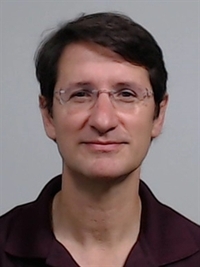Abstract:
Atmospheric Aerosols, Acidity and Impacts
Atmospheric aerosols drive a cascade of effects on climate, ecosystems and human health. They affect climate by modulating the Earth’s energy balance, clouds and precipitation; they contain toxic compounds which upon inhalation cause millions of premature deaths every year. The same particles also contain substances that act as nutrients when deposited in ecosystems, which in turn can affect primary productivity, the carbon cycle and biogeochemistry. Knowledge of the levels and drivers of atmospheric aerosol acidity (pH) is critical for understanding many aerosol processes that drive its diverse impacts. Despite its importance, aerosol pH remains poorly constrained because its direct measurement in the field is currently not possible.
This talk will focus on a number of topics related to aerosol pH. We will first present advances in constraining in-situ particle pH from the thermodynamic analysis of aerosol and gas-phase composition. Using this approach, we show that strong acidity (pH of 0 to 3) is ubiquitous in global aerosol, caused by the large difference in volatility between acidic compounds (primarily sulfate), and bases (primarily ammonia). This understanding explains why aerosol acidity in many locations (e.g., southeastern United States, south Europe) has not decreased over the past few decades, despite significant reductions in sulfates and a constant ammonia background. We then discuss under which conditions substantial changes in aerosol acidity changes occur with a focus on its impact on the solubilization of trace metals, deposition of reactive nitrogen, and responses of particulate matter to aerosol precursors (especially those conditions that can lead to intense haze episodes). We conclude with providing outlooks for the future and emphasizing the usefulness of using aerosol pH as a fundamental property for understanding aerosol state, and formulating policy.
Short Bio:
Athanasios Nenes is a Professor of Atmospheric Processes and heads the Laboratory of Atmospheric Processes and their Impacts (LAPI) at the École Polytechnique Fédérale de Lausanne, Switzerland. He is an affiliate researcher of the Institute of Chemical Engineering Science at the Foundation for Research and Technology Hellas in Patras, Greece and a founding member of the Center of Studies on Air quality and Climate Change at the institute. His research focuses on the impact of atmospheric processes (especially aerosol) on clouds, climate, air quality and ecosystems. He is the prime author of the ISORROPIA aerosol thermodynamics models, aerosol-cloud interaction parameterizations, and developer of instrumentation to measure aerosol properties and Cloud Condensation Nuclei. He is a Web of Science Highly Cited Researcher (2022,2021,2020), having authored/co-authored 327 manuscripts (Google Scholar citations: 31926, h=94). He serves as President of Atmospheric Sciences of the European Geophysical Union and co-Chair of its Annual Assembly, is a member of the UN Joint Group of Experts on the Scientific Aspects of Marine Environmental Protection (WG38: Atmospheric input of chemicals to the ocean), and served on the US National Academies Committee on the Future of Atmospheric Chemistry Research, Secretary of Atmospheric Sciences of the American Geophysical Union and Editor in the Copernicus journal Atmospheric Chemistry and Physics (2004-2019). He is an American Geophysical Union Fellow (2020); a member of the Academia Europaea (2021); a Fellow of the American Association for Aerosol Research (2021); a recipient of a ERC Consolidator Grant (2016); Vaughan Lectureship, California Institute of Technology (2014); Ascent Award, American Geophysical Union (2012); Whitby Award, American Association for Aerosol Research (2011); Houghton Award, American Meteorological Society (2009); Sigma Xi Young Faculty Award (2007); Friedlander Award, American Association for Aerosol Research (2005); NASA New Investigator Award (2004) and a National Science Foundation CAREER Award (2004). He has mentored over 20 PhD students and 20 postdocs.
What is the Joint Oslo Seminar (JOS):
- Atmospheric and climate sciences have a stronghold in Oslo among the four institutions University of Oslo, the Meteorological Institute, CICERO and NILU.
- This joint seminar invites renowned international experts to contribute to an informal series of lectures, meant to create interaction with the Oslo atmospheric and climate science community on recent highlights and analysis in the field.
- All seminars will be held on Thursdays (12:15 pm -1 pm).
